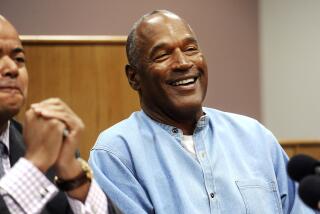British Polite to Simpson but Skeptical
OXFORD, England — Fiona Maazel of Brentwood became a casualty of O.J. Simpson’s image-polishing trip to Britain on Tuesday night when she stood on a bench in front of 1,500 people and heckled him for violence against women.
When Maazel, a 21-year-old English literature major, was escorted from the august precincts of the Oxford Union, a debating society at Oxford University, she left caring a great deal more about Simpson than most other students here and most of the British people.
On his first major public tour since his acquittal last fall on double murder charges, Simpson sold himself urbanely and articulately. But in a country where he is not well-known, he was met with skepticism.
The British media dogged his every step, and about 7 million people tuned in to watch Simpson on a soft-edged TV talk show Monday night. But his high-security movements throughout the country did not attract much public interest.
At his 72-minute appearance at the Oxford Union, Simpson charmed many listeners without necessarily persuading them, judging from hurried after-speech interviews by U.S. and British reporters. Cameras and American journalists were banned at Simpson’s request, but British print reporters were allowed in.
“He was very smooth, but I didn’t have the impression many people believed him,” said Oxford geography student Robert Winnett.
Sarah Wall, a Wellesley College student doing her junior year at Oxford, said: “He was very polished, prepared, coached, and I was impressed by his intelligence. Still, I think he did it.”
Simpson’s visit brought quite a spectacle to one of the world’s great universities. More than 120 photographers responded to a pre-speech photo call in the debating hall of the union.
Outside on a chill spring night, a few protesters, nearly all Americans, drew their own legion of cameras. Some high-toned passersby from the Oxford community politely asked who Simpson was.
Idara Umanah, a Nigerian student of petroleum engineering who came to Oxford from Howard University in Washington, said he showed up “to testify for O.J., to give him my support.”
For day-tripper Beth Macias, an attorney from Los Angeles, it was a windfall.
“We happened to come from London just for the day, and we stayed to protest. I think it’s alarming that a person who beats his wife reaps the benefits of her murder,” she said.
The ban on American reporters meant that some of the best young minds in Britain found themselves scribbling madly and sneaking in tape recorders in a one-night stand for American newspapers and networks.
They said afterward that the reception for Simpson was warm and that he seemed relaxed and jovial. Speaking off the cuff before answering about 30 questions, Simpson cracked a series of jokes, many of them directed at the American media.
There was some laughter from a crowd that included a good sampling of Americans studying at Oxford. But Maazel, whose family lives a few minutes’ walk from where Simpson’s ex-wife, Nicole Brown Simpson, and her friend Ronald L. Goldman were murdered, was not amused.
“This isn’t funny,” hollered Maazel, who goes to Williams College and is spending her junior year here. “You’ve been sued for wrongful death, and you have a history of assault and violence. Your being here is an insult to the [female] gender and the entire Oxford community. Don’t come here for sympathy.”
After she was forced to leave, Maazel was still angry. “They were cheering for him, laughing at his jokes. It was sick stuff,” she said.
Many of the questions to Simpson came from Americans who had detailed knowledge of his case, but he appeared to offer little new information in answering them.
Tuesday’s university visit was the last major public appearance on Simpson’s carefully planned five-day visit to Britain.
On Monday night, Simpson was a guest on a 15-minute live TV talk show hosted by husband and wife Richard Madeley and Judy Finnigan, who are trying to break into prime time after a long run on daytime television.
His presence won them a 40 audience share, but his comments left British critics unconvinced.
The Daily Mirror, one of Britain’s mass-circulation tabloids, had 12 police and legal experts watch the show.
“Nine said he was guilty of lying, two couldn’t make up their minds, and one said he was innocent,” the Mirror reported.
Guilty, said John O’Connor, former commander of Scotland Yard’s Flying Squad detectives: “He didn’t look as though he was grieving for anyone but himself. Simpson’s an actor, and he’s had plenty of time to rehearse his lines.”
Not guilty, said Nigel Sangster, criminal attorney: “He had an answer for everything even though he wasn’t allowed to develop his answers before the next question was fired. But he didn’t say anything that made me change my mind.”
Undecided, said Richard Wiseman, voice analyst and expert on deception from the University of Hertfordshire: “It was a very smooth performance. But I think many people will think he was not being entirely upfront.”
*
Special correspondent Robert Winnett contributed to this report.
More to Read
Sign up for Essential California
The most important California stories and recommendations in your inbox every morning.
You may occasionally receive promotional content from the Los Angeles Times.










